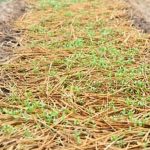Weed control is a crucial aspect of maintaining a successful vegetable garden, as invasive plants can compete for resources and hinder the growth of your crops. One common method used by gardeners is weed block, a material designed to suppress the growth of unwanted vegetation. The question many often ask is, “Is weed block safe for vegetable gardens?”.
Weed block, also known as landscape fabric or weed barrier, comes in various types and materials, each serving the purpose of inhibiting weed growth. This method can be effective in reducing the need for manual weeding and conserving moisture in the soil. However, there are both benefits and drawbacks to using weed block in vegetable gardens that should be considered.
While the use of weed block can offer advantages such as reduced labor and enhanced moisture retention, there are also concerns over its safety for vegetable gardens. Some materials may contain chemicals that could potentially leach into the soil and affect plant health. It is essential to weigh these safety concerns when deciding whether to incorporate weed block into your garden maintenance routine.
What Is Weed Block
Weed block, also known as landscape fabric or weed barrier, is a material used in gardens to prevent the growth of unwanted weeds. It comes in various types, such as woven and non-woven varieties. Woven weed block fabric is made by weaving polypropylene fibers together, creating a durable and long-lasting barrier against weeds. On the other hand, non-woven weed block fabric is softer and more flexible, making it easier to cut and manipulate for installation.
Types of Weed Block Fabric
There are different types of weed block fabric available in the market based on their thickness, durability, and UV protection. Some fabrics are designed specifically for vegetable gardens to allow water and nutrients to penetrate while blocking out sunlight that weeds need to grow. It is essential to select the right type of weed block fabric that suits your specific gardening needs.
Benefits of Using Weed Block Fabric in Vegetable Gardens
One of the main advantages of using weed block fabric in vegetable gardens is the prevention of weed growth. By creating a physical barrier between the soil and sunlight, weed block fabric helps reduce the need for manual weeding and saves time and effort for gardeners.
Additionally, it can help conserve water by reducing evaporation from the soil surface and provide insulation to maintain consistent soil temperatures. The use of weed block fabric also aids in controlling soil erosion and improving overall garden aesthetics.
Benefits of Using Weed Block in Vegetable Gardens
Using weed block in vegetable gardens can offer numerous benefits to gardeners, making it an essential tool for maintaining a healthy and flourishing garden. One key advantage of using weed block is its ability to suppress the growth of unwanted plants, such as weeds, that compete with vegetables for nutrients, sunlight, and water. By creating a barrier between the soil and the surface, weed block helps prevent weeds from sprouting and spreading throughout the garden.
Another benefit of using weed block in vegetable gardens is that it helps conserve moisture in the soil by reducing evaporation. This is especially important during hot and dry weather conditions when plants require more water to thrive. Additionally, weed block can provide insulation to the soil, helping regulate temperature fluctuations that can stress plants and hinder their growth.
Furthermore, by preventing weeds from taking root in vegetable gardens, weed block allows gardeners to spend less time weeding and more time tending to their plants. This not only saves effort but also promotes a healthier environment for vegetables to thrive without competing with invasive species for resources. Overall, incorporating weed block into garden maintenance practices can lead to a more efficient and productive growing season for vegetable crops.
| Benefits of Using Weed Block | Details |
|---|---|
| Suppression of unwanted plant growth | Weed block prevents weeds from sprouting and spreading in the garden. |
| Conservation of moisture | Weed block reduces soil evaporation, helping retain essential moisture for plant growth. |
| Time-saving weeding | Less time spent on weeding means more time for caring for vegetable plants. |
Drawbacks of Using Weed Block in Vegetable Gardens
While weed block can be a helpful tool in keeping unwanted plants at bay in vegetable gardens, there are some drawbacks to consider before incorporating it into your gardening routine. One of the main concerns is that weed block can also prevent water and nutrients from reaching the soil beneath, potentially impacting the growth of your vegetable plants. This can lead to unhealthy soil conditions and hinder the overall health and productivity of your garden.
Another drawback of using weed block in vegetable gardens is that it can create a barrier that restricts airflow to the soil. Proper ventilation is crucial for maintaining a healthy garden ecosystem, as it promotes beneficial microorganisms and helps prevent moisture buildup that could attract pests or create mold issues. By inhibiting airflow with weed block, you may inadvertently disrupt the natural balance of your garden environment.
Additionally, some types of weed block materials may break down over time and release harmful chemicals into the soil. This could potentially contaminate your vegetables and affect their safety for consumption.
As such, it is important to carefully research and select a safe and environmentally friendly option if you choose to use weed block in your vegetable garden. Considering these drawbacks, it is essential to weigh the pros and cons before deciding if weed block is the right choice for your particular gardening needs.
Safety Concerns
Chemical Composition of Weed Block
Weed block, also known as landscape fabric, is typically made from synthetic materials such as polypropylene or polyester. These materials are designed to be durable and provide effective weed control by blocking sunlight and preventing weeds from germinating. However, some weed blocks may contain chemicals or additives that could potentially leach into the soil and affect the growth of vegetables in the garden.
Potential Risks to Vegetable Plants
One of the main concerns regarding the safety of using weed block in vegetable gardens is the potential risk of chemical exposure to plants. If the weed block contains harmful substances that can leach into the soil, it may affect the health and growth of vegetable plants. Some chemicals can interfere with nutrient absorption, root development, and overall plant growth, leading to stunted or unhealthy vegetables.
Environmental Impact
In addition to the risks posed to vegetable plants, there is also a concern about the environmental impact of using certain types of weed block in gardens. Chemicals or additives present in some weed blocks can contaminate soil and water sources, affecting not only your garden but also surrounding ecosystems. It is essential to choose a weed block that is labeled as safe for vegetable gardens and environmentally friendly to minimize these risks.
Overall, when considering whether weed block is safe for vegetable gardens, it is crucial to do thorough research on the specific product you plan to use. Look for organic or natural options that are free from harmful chemicals and ensure that they are certified safe for use in vegetable gardens. Additionally, consider alternative methods for controlling weeds that do not pose risks to your vegetables or the environment.
Alternative Methods for Weed Control in Vegetable Gardens
When it comes to weed control in vegetable gardens, there are various alternative methods that gardeners can consider aside from using weed block. One popular option is mulching, which involves applying a layer of organic material such as straw, bark, or wood chips to the soil surface around plants. Mulch helps to suppress weed growth by blocking sunlight and preventing weed seeds from germinating. Additionally, mulch helps to retain soil moisture and regulate temperature.
Another effective alternative method for weed control in vegetable gardens is hand-weeding. While it may be more labor-intensive than using weed block or mulching, hand-weeding allows gardeners to selectively remove weeds without causing harm to their vegetable plants. By regularly inspecting the garden and manually pulling out weeds, gardeners can prevent them from competing for nutrients with their crops.
Some gardeners also opt for companion planting as a natural way to control weeds in vegetable gardens. Companion planting involves planting certain species together that benefit each other in some way. For example, planting herbs like basil and dill among your vegetables can help deter pests and suppress weed growth. This method not only controls weeds but also promotes biodiversity and overall garden health without the need for synthetic chemicals or materials.
How to Properly Install Weed Block in Vegetable Gardens
Weed block, also known as landscape fabric or weed barrier, is a material used to suppress the growth of weeds in gardens, including vegetable gardens. Proper installation of weed block is crucial to ensure effective weed control and to maintain a healthy garden environment. Here are some steps to properly install weed block in vegetable gardens:
- Prepare the Soil: Before installing the weed block, it is important to prepare the soil by removing existing weeds and debris. Loosen the soil with a shovel or garden fork and level it with a rake.
- Measure and Cut: Measure the area where you will be laying the weed block and cut the fabric accordingly. It is recommended to overlap the edges of each piece by a few inches to prevent weeds from growing through any gaps.
- Lay the Weed Block: Lay the weed block fabric over the prepared soil, ensuring that it covers the entire area where you want to prevent weed growth. Secure the edges of the fabric with stakes or heavy rocks to keep it in place.
Properly installed weed block can effectively suppress weeds in vegetable gardens, reducing competition for nutrients and water among plants. It also helps retain moisture in the soil and regulates temperature, creating an ideal growing environment for vegetables. By following these steps, you can ensure that your vegetable garden remains free of weeds while promoting healthy plant growth.
However, it is important to regularly check and maintain the weed block fabric to ensure its effectiveness. Inspect for any tears or holes that may allow weeds to grow through, and replace or patch them as needed. Additionally, monitor for any signs of waterlogging or poor drainage caused by the fabric, which can impact plant health. With proper installation and maintenance, using weed block can be a safe and effective method for controlling weeds in vegetable gardens.
Maintaining the Effectiveness of Weed Block in Vegetable Gardens
When it comes to maintaining the effectiveness of weed block in vegetable gardens, proper care and maintenance are key. By taking the necessary steps to ensure your weed block is in good condition, you can maximize its benefits and keep your garden free from invasive plants. Here are some tips on how to properly maintain your weed block:
- Regular Inspections: Periodically check your weed block for any signs of wear and tear, such as rips or tears. Replace any damaged sections promptly to prevent weeds from penetrating through.
- Weed Removal: While weed block helps control unwanted growth, some weeds may still find their way through. Take the time to remove any weeds that manage to break through the barrier to maintain its effectiveness.
- Proper Installation: Ensure that your weed block is installed correctly by overlapping seams and securing it in place with pins or weights. This will help prevent shifting or movement that could expose bare soil to potential weeds.
In addition to these maintenance tasks, it’s essential to also consider the overall health of your vegetable garden. Proper watering, fertilization, and pest control measures can help promote the growth of your crops while minimizing the chances of weed infestations. By incorporating these practices alongside weed block usage, you can create a thriving garden environment that is both productive and visually appealing.
Ultimately, the combination of using weed block and maintaining its effectiveness can lead to a successful vegetable garden filled with healthy plants and minimal weed-related issues. With proper care and attention, you can enjoy the benefits of a well-maintained garden space that is not only aesthetically pleasing but also productive in providing fresh produce for your enjoyment.
Conclusion
In conclusion, the use of weed block in vegetable gardens can be a beneficial method for controlling unwanted vegetation and maintaining a clean and organized garden space. While there are definite advantages to employing weed block, such as reduced weed growth, moisture retention, and protection for plant roots, there are also drawbacks to consider.
These drawbacks include the potential for blocking essential nutrients from reaching the soil, increased difficulty in planting new crops, and the cost associated with purchasing and installing weed block materials.
The key question that arises is whether weed block is truly safe for vegetable gardens. It is important to carefully consider the type of weed block being used, as some may contain harmful chemicals or substances that could leach into the soil and affect the vegetables being grown.
It is recommended to opt for organic or eco-friendly options that pose minimal risk to both your plants and the environment. Additionally, proper installation and maintenance of weed block can help mitigate any potential safety concerns.
While weed block can be a useful tool in managing weeds in vegetable gardens, it may not always be the best option for every gardener. Some may prefer alternative methods such as mulching, hand-weeding, or using cover crops to control weeds naturally. Ultimately, the decision on whether to use weed block in your own vegetable garden should be based on careful consideration of its benefits and drawbacks in relation to your specific gardening needs and preferences.
Frequently Asked Questions
Can You Use Weed Block in Vegetable Garden?
Using weed block fabric in a vegetable garden can be beneficial in reducing weeds by preventing them from germinating and growing. However, it’s important to properly install the weed block to ensure it doesn’t hinder the growth of your vegetables.
What Is the Best Weed Block for Vegetable Gardens?
The best weed block for vegetable gardens is one that allows water and nutrients to penetrate through to the soil while effectively blocking weeds. Look for a permeable landscape fabric that is durable and UV resistant for long-lasting weed control.
Can I Use Weed Killer Around My Vegetable Garden?
It is not recommended to use traditional weed killers around a vegetable garden, as they can harm your edible plants and contaminate the soil. Instead, opt for organic or natural weed control methods like hand weeding, mulching, or using vinegar solutions to keep weeds at bay without risking your vegetables’ health.

If you’re looking to get into vegetable gardening, or are just looking for some tips on how to make your current garden better, then you’ve come to the right place! My name is Ethel and I have been gardening for years. In this blog, I’m going to share with you some of my best tips on how to create a successful vegetable garden.





